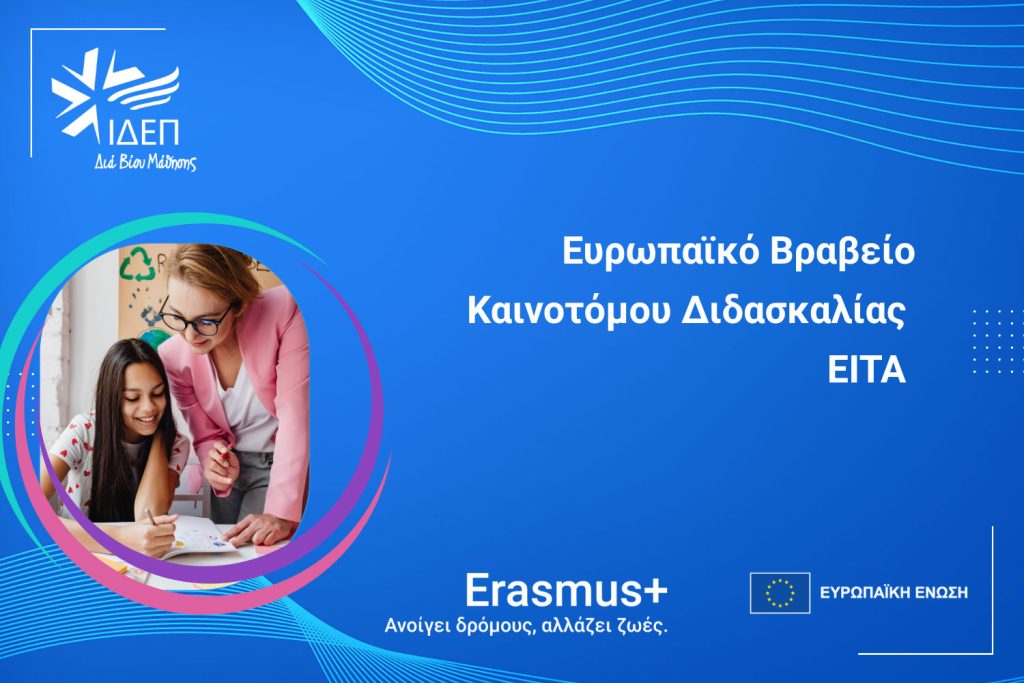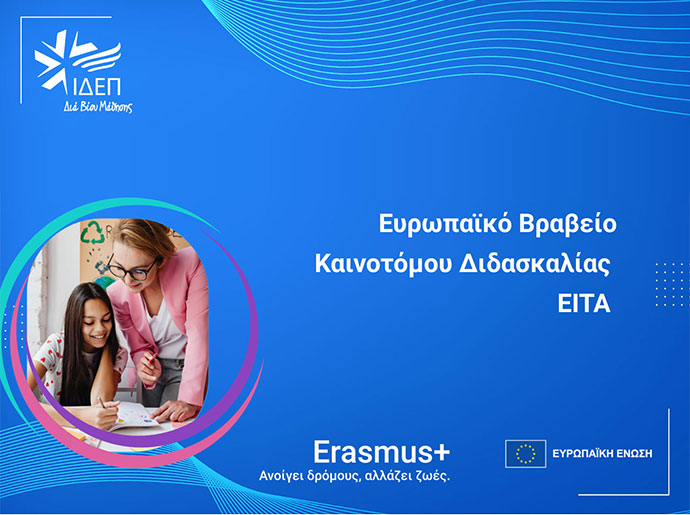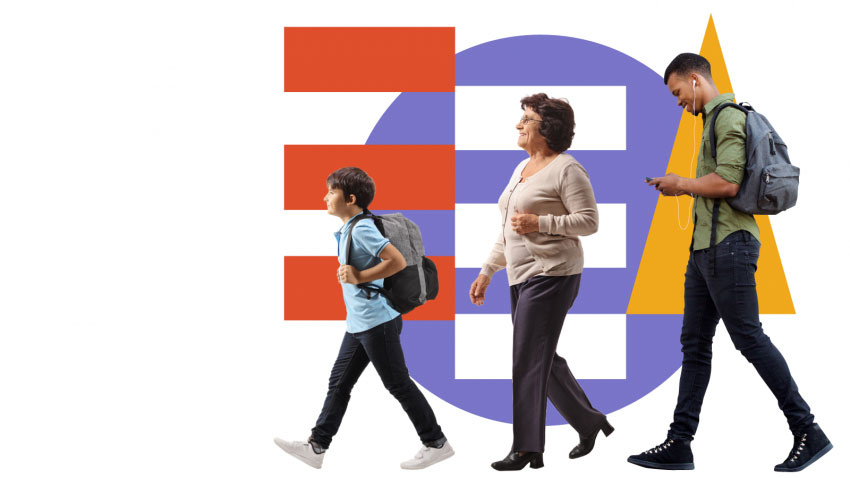Overview of the European Innovative Teaching Award and European Language Label
The European Innovative Teaching Award (EITA) was established in 2021 as an annual award for the 2021 – 2027 Programming Period. Since 2025 the award expands to include the European Language Label – ELL.
Both initiatives contribute to the European Education Area strategic priority focusing on “enhancing competences and motivation in the education profession”. They also recognise the contribution of the Erasmus+ programme to the European Education Area and the importance of cooperation and networking of schools across Europe. Further work on the European Education Area as part of the Union of Skills is envisioned. This will be reflected in the future EU Teachers Agenda which calls for improving the working conditions, training and career prospects of teachers. The EITA and the ELL are relevant tools for supporting these policy objectives while contributing to the broadest possible visibility and showcasing of teachers’ achievements.

The EITA and ELL share a common target group and common broad objectives focusing on teachers and trainers’ involvement in the European cooperation with Erasmus+ projects. They are non-monetary awards, aiming at valuing and raising the attractiveness of the teaching profession, more specifically, recognising the involvement of teachers in successful Erasmus+ projects and their outcomes. Bringing the two closer, by linking the ELL as one of the categories of the EITA, will enhance coherence and create more visibility for the awards.
The specific objectives of the EITA and ELL are to:
- celebrate the achievements of teachers and schools and give more visibility to their work
- identify and promote outstanding teaching and learning practices
- foster mutual learning between teachers and school staff
- highlight the value of the Erasmus+ programme to European teacher collaboration and to the learners.
Implementation of the European Innovative Teaching Award
-
The award is given on an annual basis to finalised Erasmus+ projects in the fields of school education, vocational education and training, and adult education, and they are selected by the Foundation for the Management of Lifelong Learning Programmes, being the Erasmus+ National Agency of Cyprus.
The selection and assessment of projects is based on predefined procedures and criteria set out by the European Commission and the Erasmus+ National Agencies.
The award has a symbolic value, as all Erasmus+ projects are implemented on the basis of funding. However, all the awarded projects will be promoted at national and European level as good practice examples of innovation in education and will be represented at the national and European Award Ceremony.
Scope of Implementation and Award Categories
Up to five awards per EU Member State and third country associated to the programme will be given, one for each of the following categories:
- early childhood education and care
- school education (primary education and general secondary education)
- vocational education and training
- adult education
- European language label
Selection Process
- The National Agency selects projects on the basis of the eligibility criteria, the annual thematic priority and the selection criteria. Following the selection of projects, the National Agency will contact the shortlisted coordinating organisations/schools/institutions to acquire the necessary information in order to proceed with the final selection of nominees.
Only projects complying with all following criteria are considered eligible:
- KA1 and KA2 projects that started between 2020 – 2024 which are finalised*
- Projects that have been funded by CY01 National Agency and had a Cypriot organisation as project coordinator
- Projects that have not received the award in previous years
- Projects that addressed the thematic priority as defined annually by the European Commission**
* A project whose final report has been duly submitted, evaluated and closed in administrative terms is to be considered as a finalised one.
**This criterion is not mandatory in the ELL category for the 2025 award.
In 2025 the annual theme is ‘Citizenship education – participation in democratic life, common values and civic engagement’.
The annual theme explores empowering people to become active citizens, promoting social inclusion and ensures that diverse voices contribute to shaping a more inclusive and democratic Europe. This includes understanding the European Union context, notably with regards to the common EU values, including respect for democratic principles, human dignity, unity and diversity, intercultural dialogue as well as the European social, cultural and historical heritage.
The theme also addresses citizens’ limited participation in democratic processes and their lack of knowledge and tries to help them overcome the difficulties in actively engaging and participating in their communities and in the Union’s political and social life through formal or non-formal learning activities. Active citizenship and ethics in lifelong learning can help foster the development of social and intercultural competences, critical thinking and media literacy.
The EITA will be awarded based on the following criteria. Each criterion should be assessed on a scale from 1 (poor) to 10 (excellent):
| Methodologies used | In what ways are the teaching and learning approaches elaborated and implemented in the project innovative?
|
| Innovation environments | In what ways do learning environments involved in the project support innovative teaching and learning approaches?
|
| Teachers’ role | In what ways do teachers involved in the project influence the innovative teaching and learning processes?
|
| Impact and outputs | What is the impact of the innovative teaching and learning processes elaborated and implemented in the project?
|
Thematic Priority for 2024
-
In 2024, the EITA annual theme was ‘Well-being at school‘ in connection with the implementation of Pathways to School Success initiative.
The annual theme explored building a systemic, whole-school approach to well-being and mental health in schools.You can find all the awarded project in the Compendium of the 2024 European Innovative Teaching Award laureates.
Awarded Cypriot Projects
Thematic Priority for 2023
-
In 2023, the EITA annual theme was ‘Education and innovation’ in connection with the European Year of Skills.
The annual theme explored the introduction of existing and emerging technologies in the contemporary education systems. These include in particular artificial intelligence, robotics, coding, programming, virtual reality, entrepreneurship, etc.You can find all the awarded project in the Compendium of the 2023 European Innovative Teaching Award laureates.
Awarded Cypriot Projects
Project Number: 2020-1-CY01-KA229-065945
Organisation: Mandria Primary School
Thematic Priority for 2022
-
In 2022, the EITA annual theme was ‘Learning together, promoting creativity and sustainability’, directly linked to the European Commission’s initiative New European Bauhaus (NEB).
The New European Bauhaus initiative connects the European Green Deal to our daily lives and living spaces. It calls on all Europeans to imagine and build together a sustainable and inclusive future that is beautiful for our eyes, minds, and souls.
The building elements of the 2022 annual theme are:
- ‘Creativity’ – linked to the NEB priority ‘beautiful’, an important theme in education. In this context, the impact of spaces and architecture on learning will be addressed
- ‘Sustainability’ – a general Commission priority and the key element of NEB
- ‘Learning together’ – participatory and inclusive element, general Commission priority and an element of NEB
You can find all the awarded project in the Compendium of the 2022 European Innovative Teaching Award laureates.
Awarded Cypriot Projects
No project was awarded under this category.
Project Number: 2017-1-CY01-KA219-026758
Organisation: Gymnasium of Polis Chrysochous
Cultivation of Skills and Contact with the Beneficial Power of Technology
Project Number: 2018-1-CY01-KA116-046830
Organisation: Perifereiaki Georgiki, Techniki kai Epangelmatiki Scholi Ammochostou – Avgorou (Regional Agricultural, Technical and Vocational School of Education and Training Famagusta – Avgorou
Thematic Priority for 2021
-
For the 2021 European Innovative Teaching Award the annual topic was distance/blended/hybrid learning to show how using distance learning and teaching practices and related digital tools or other forms of blended leanring contribute to effective and inclusive education. This thematic priority was particularly relevant for the Covid-19 context and was linked to the Digital Education Action Plan 2021-2027.
You can find all the awarded project in the Compendium of the 2021 European Innovative Teaching Award laureates.
Awarded Cypriot Projects
The Living Book – Augmenting Reading For Life
Project Number: 2016-1-CY01-KA201-017315
Organisation: Makedonitissa 3 Primary School – Stylianou Lena








